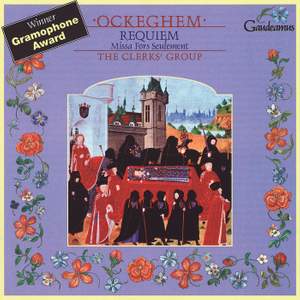Ockeghem: Requiem
The Clerks' Group, Edward Wickham
Top billing goes to the Requiem, Ockeghem's most widely recorded work, and perhaps his most enigmatic piece, stylistically very wide-ranging and diverse. Aesthetic judgement is hard to pass,... — More…
Downloads
What are FLAC and MP3?Contents
Ockeghem: Missa Fors Seulement
Work length16:51
$2.55
$3.45
- The Clerks' Group
- Edward Wickham
- Recorded: 1996-05-06
- Recording Venue: St Andrews Church, West Wratting
1. Kyrie
Track length3:24
$0.85
$1.15
2. Gloria
Track length5:44
$0.85
$1.15
3. Credo
Track length7:43
$0.85
$1.15
Ockeghem: Fors Seulement
Work length8:13
$0.85
$1.15
- The Clerks' Group
- Edward Wickham
- Recorded: 1996-05-06
- Recording Venue: St Andrews Church, West Wratting
Rue, P: Fors seulement
Work length3:36
$0.85
$1.15
- The Clerks' Group
- Edward Wickham
- Recorded: 1996-05-06
- Recording Venue: St Andrews Church, West Wratting
Brumel, A: Du tout plongiet / Fors seulement
Work length12:28
$0.85
$1.15
- The Clerks' Group
- Edward Wickham
- Recorded: 1996-05-06
- Recording Venue: St Andrews Church, West Wratting
Ockeghem: Requiem
Work length29:55
$4.25
$5.75
- The Clerks' Group
- Edward Wickham
- Recorded: 1996-05-06
- Recording Venue: St Andrews Church, West Wratting
1. Introit
Track length4:32
$0.85
$1.15
2. Kyrie
Track length4:28
$0.85
$1.15
3. Graduale
Track length4:52
$0.85
$1.15
4. Tractus
Track length7:43
$0.85
$1.15
5. Offertorium
Track length8:20
$0.85
$1.15






